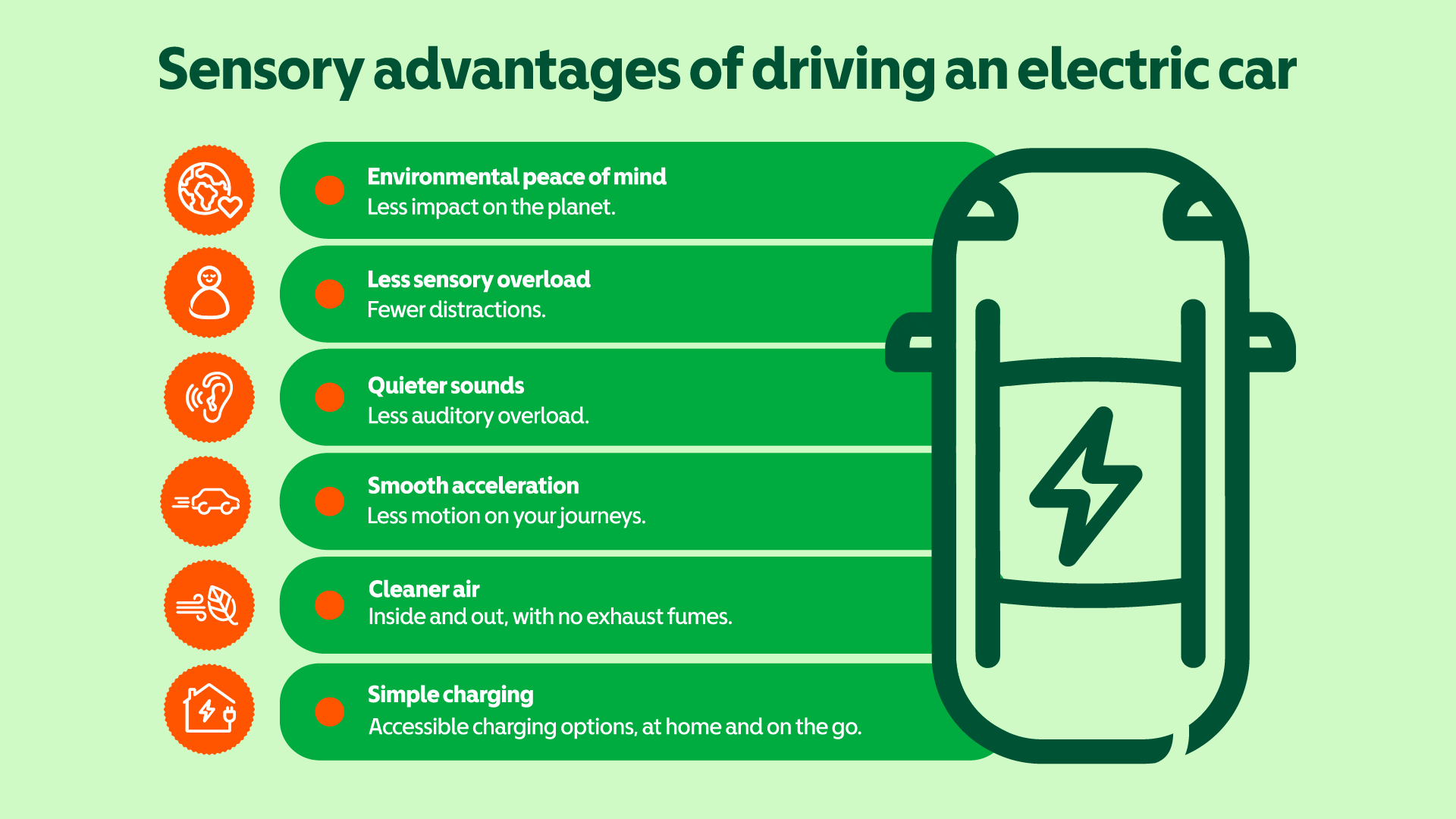We uncover the sensory benefits of driving an electric car. Discover how electric vehicles (EVs) could increase your comfort, quality of life, and mental health.
Driving is a sensory-rich experience. It’s full of bright lights, loud noises, and quick movements, which can make things difficult for people with sensitives.
You cannot control what’s going on outside your car. But you can control which car you get, and how you set things up inside your vehicle.
Sensory challenges while you’re driving
All drivers need to be alert and focused. But sensory overload can cause stress and fatigue, which affect your reaction times and awareness of hazards.
As well as the sights, noises and smells, there are physical sensations to watch out for. This could be vibrations in your seat or the grip of your steering wheel. For some people, including your passengers, these sensations are difficult or even painful.
Juggling these challenges while you’re trying to enter a tricky roundabout or join a busy motorway is not easy. And the car you’re in can have a big impact on your comfort.
A petrol or diesel car usually means strong fume smells and loud engine revs. Both can be overwhelming. EVs, on the other hand, have neither of these.
James Hunt is one of our Scheme ambassadors, and one of our customer’s who’s made the switch. He says:
‘Having an electric car is going to make life so much easier for me and my boys. Public transport is loud and busy, and that’s everything my boys struggle with. Knowing they’ve got their safe space means we can get to so many more places.’
How electric vehicles (EVs) could improve your comfort
One of the benefits of driving an electric car is quiet sounds. According to Automotive iQ, silence prompts a different and more positive emotional response to loud noise, like the rattle of a diesel engine.
Less noise means you can enjoy your tunes more clearly and hear conversations with your passengers better too. It also means less noise outside of your car, for people around town.
EVs are also known for being smooth to drive. This will make things easier for you if you have joint pain or conditions that are triggered by movement.
Another benefit is no strong smells at the petrol station. Recharging is more pleasant in general, as you just plug in and wait, ideally while grabbing a drink.
Remember, when you lease an EV on the Motability Scheme, we’ll arrange a home chargepoint and standard installation, or a subscription to the bp pulse network of public chargepoints, as part of your lease.
Studies show electric vehicle (EV) drivers are happier
A study by the University of York used EV taxis and diesel taxis to see if EVs positively impact stress and anxiety.
They discovered EV drivers had higher concentration. The drivers’ heart rates were also less variable in an EV, because they were much calmer.
It also showed people driving an EV were much happier than those driving diesel, and less stressed, with fewer distractions.
Simply put, a quieter driving environment lets people concentrate more and frees them up to get on with driving, in a focused and calm way.
How a shift to electric could improve our cities and your mental health
A big change in our pollution-filled cities would be positive for all drivers. Dr Manasi Kumar told the BBC: ‘we have very strong evidence that neuro-developmental disorders get severely affected because of the poor air qualities.’
Professor Tim Lenton added: ‘wide scale adoption of electric vehicles is going to help mental health, because it’s going to produce cleaner air and less noise in cities.’
Some cities have already taken steps towards sensory comfort. You can check if your favourite shops and sports venues have quiet spaces for neurodiverse people. You might be surprised how many of them offer this.
Driving an electric vehicle (EV) and your mental health
There’s a connection between being environmentally conscious and having good mental health. Research shows people who are more connected with nature are usually happier.
Nature can generate a lot of positive emotions, including joy. And people who are connected to nature usually have less depression and anxiety.
Not surprisingly, people who are strongly connected to nature usually have pro-environmental beliefs and behaviours, like recycling often and driving an EV.
Comfort for our customers, in an electric vehicle (EV)
We often hear how our Scheme customers enjoy their EVs. Rose and William Gee spoke about how their EV has changed their lives, and their comfort, in our charging solution article.
William said: ‘our Hyundai Ioniq 5 is perfect for everyday life’. He explains: ‘It had the right height, lots of boot space, and all the comfort features we were after.’
More people than ever are making the switch to EV, for a variety of reasons, including their positive impact on the environment.
How switching to electric could benefit your pocket
Before you think about getting an EV to improve your sensory needs, it’s important you understand the costs.
Public charging can be expensive, but charging at home on the right tariff could save you money, compared to running a petrol or diesel car.
The most convenient and cost-effective way to charge your electric car is at home. Most people can get a home chargepoint with off-street parking, like a driveway or garage.
You can use our quick tool to help you figure out if an EV is right for you right now.
Our handy sensory summary
Here’s a snapshot of all the sensory advantages we’ve covered in this article:
- An EV is quiet and smooth, which means you’re free to focus on driving
- Studies have shown EVs positively impact stress, anxiety, and happiness
- A quiet drive means more audio space for your music and conversations
- Overstimulation in our cities if bad for us, but a shift to EVs could improve this
It’s clear the motoring industry is moving in a direction that will make driving calmer and more inclusive for everyone. And that’s a great thing.
Sign up to our electric car series
It’s our exciting email series for anyone looking to learn more about electric cars.
We’ll explain how they work and show you what life with one could look like. You’ll get one email each week, for eight weeks.
Related articles
How the new car market is changing in 2025
How your Electric Vehicle could save you money and help the planet
Why we went electric and never looked back: Our cross pavement charging solution
![]()







